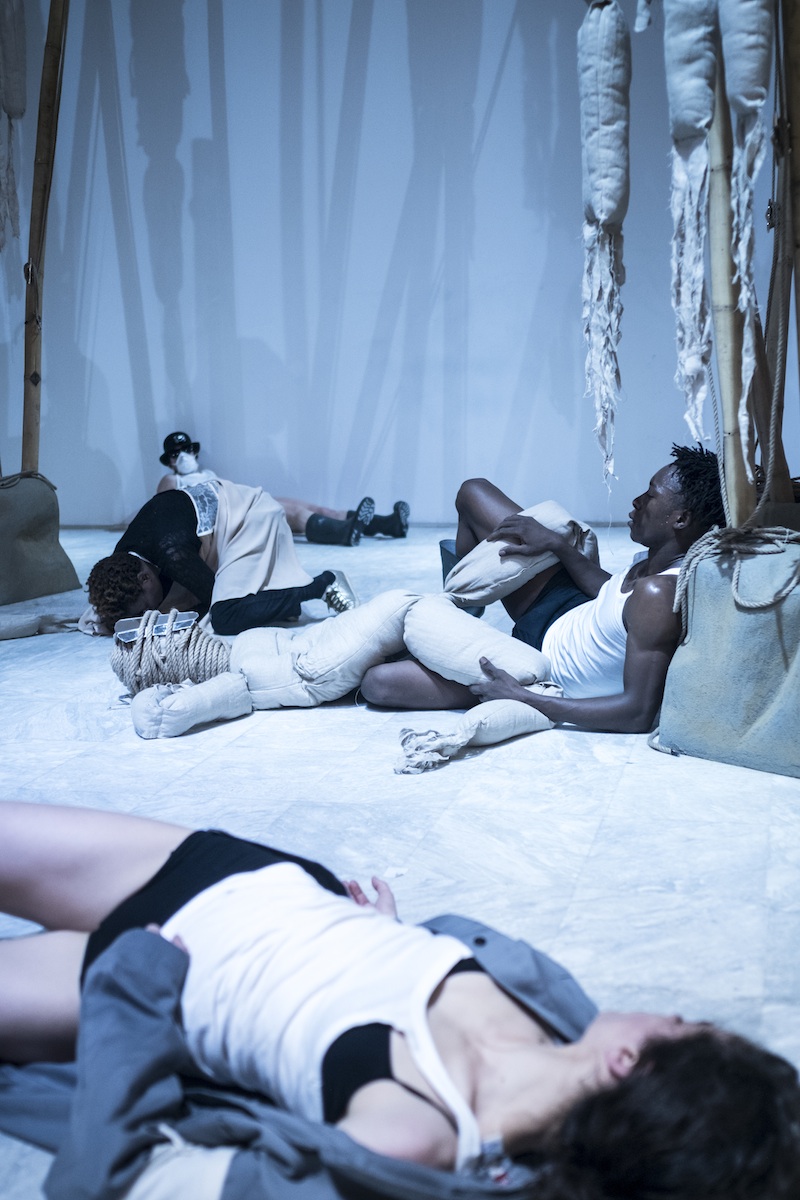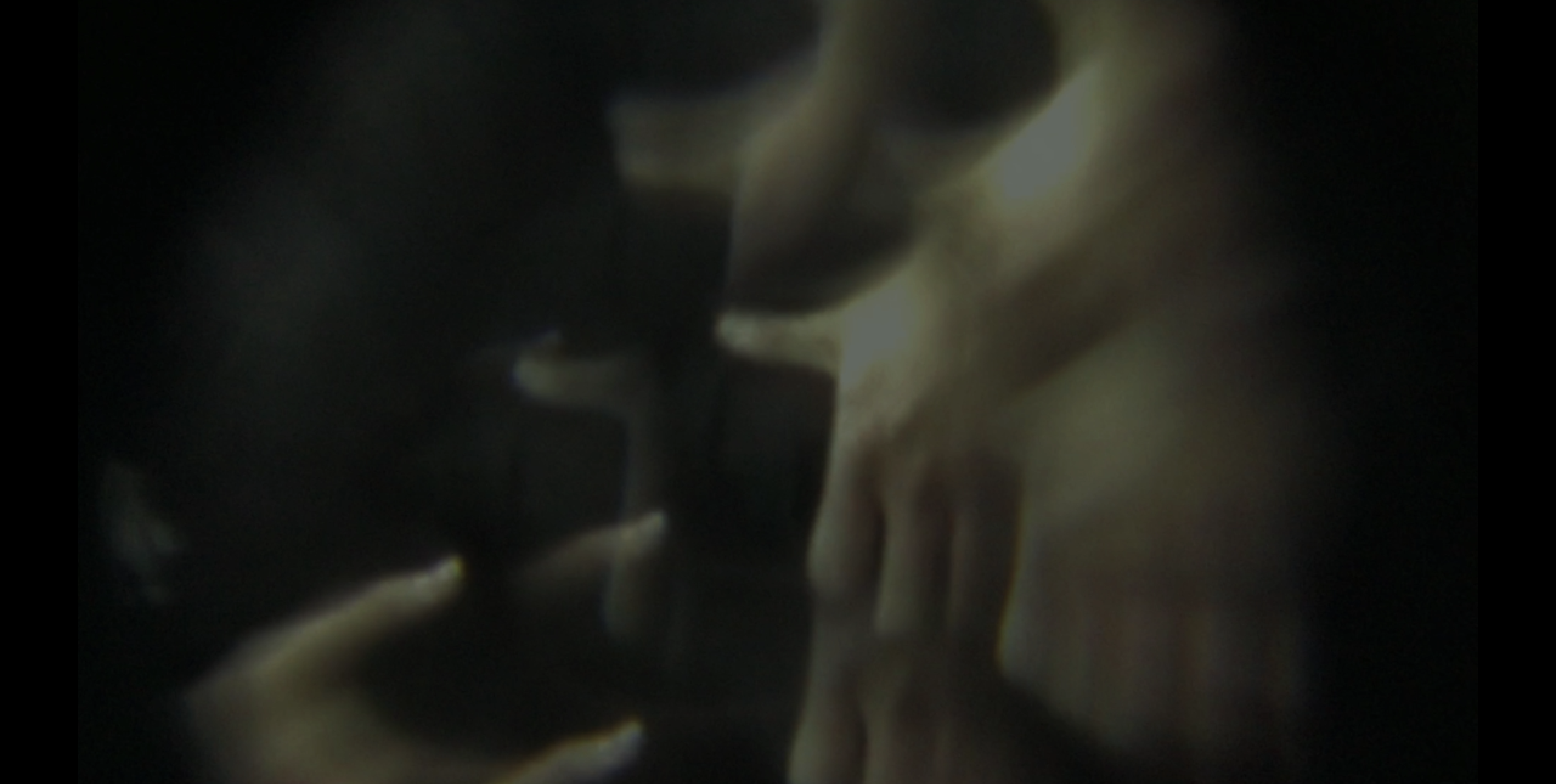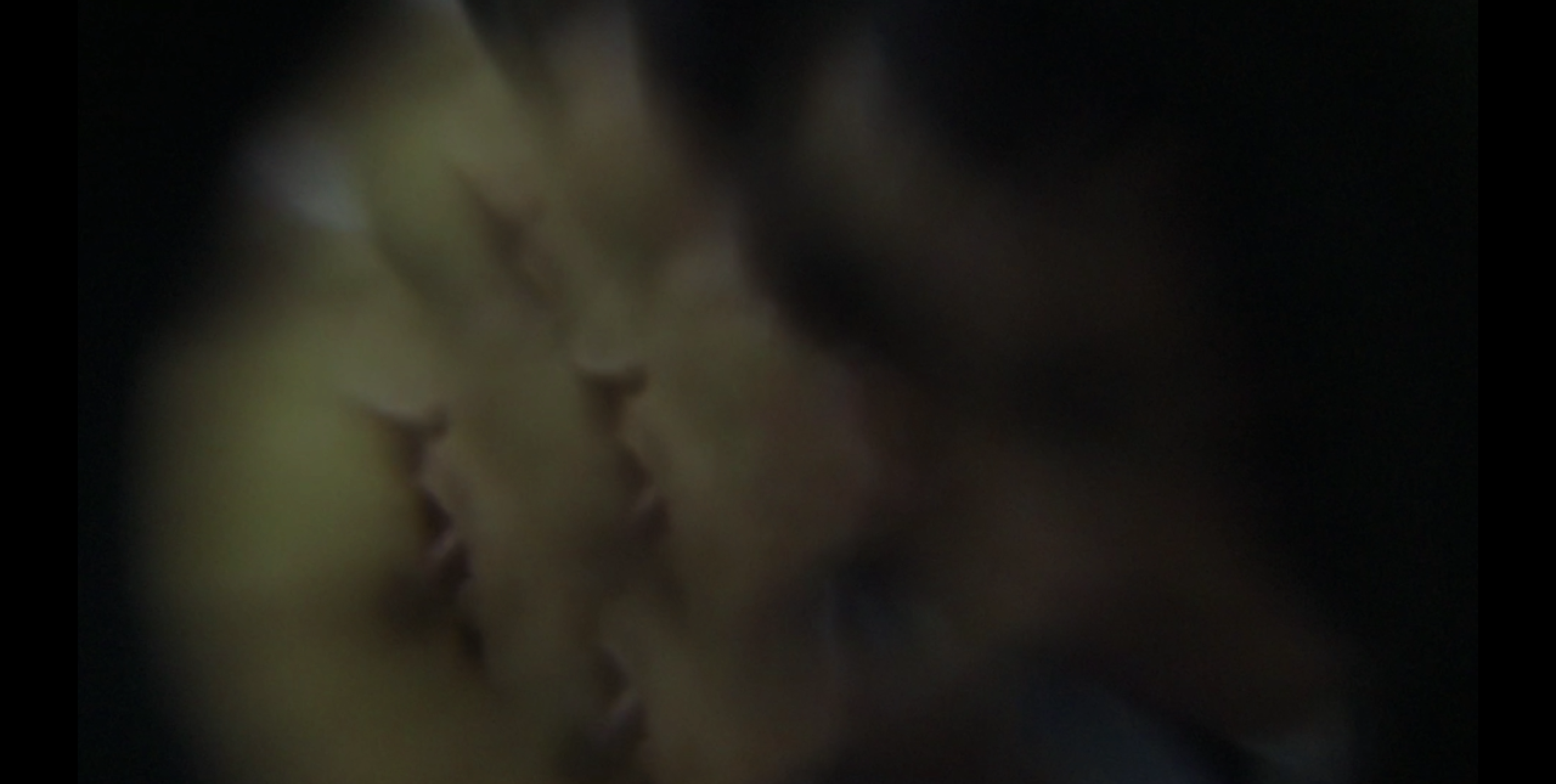Darren Caffrey discusses Kettly Noël’s installation/performance work Zombification (2017) and Terre Thaemlitz’s premiered screening of Deproduction (2017) in order to explore the implications of the overall curatorial framework of documenta 14 and its subheading ‘Learning from Athens’ devised by this year’s director Adam Szymczyk.
Coming around every five years, documenta is a carefully planned operation located in the German city of Kassel, close to the old West/East divide. Arguably a product of post-war cultural reparations, documenta has traditionally focused on utilising the visual arts as a communal attraction. The potential to address an audience on a grand scale is perhaps epitomised by Joseph Beuys’ work for documenta 7 in 1982 where 7000 Oaks saw as many trees planted throughout the city. By the time of documenta 8, it’s hard to imagine there was anyone who had not noticed the addition to their city and lives. But it was also in the 1980s, when English first appeared in accompanying texts and catalogues, that documenta seemingly opened out to a global audience. This year, for documenta 14, the traditional 100 days of events and exhibitions were scheduled for both Kassel and Athens in Greece. An overlap of eight weeks provided its own tacit connections for artists and visitors to make use of but perhaps the most obvious of all was identified by Greece’s flagship airline which arranged twice weekly flights between Kassel and Athens International Airport.
Last time around, curator Carolyn Christov-Bakargiev chose to expand out and away from the traditional setting by involving satellite stations for dOCUMENTA 13. Among other sites, she selected Kabul in Afghanistan and Cairo in Egypt for these temporary interventions. Yet by bringing art to exotic places, even places of conflict, she also seeded the notion that documenta could travel. Doing so to limited acclaim, the message was still clear: documenta has designs on being more than a uniquely German or Anglo-Saxon instalment of contemporary visual practice. Since documenta 11, curated by Okwui Enwezor, interest has extended far beyond Europe, but given the many images of social unrest and general agitation coming out of Athens since the European economic crisis, why not stage a documenta there? It might help.
Perhaps the choice to partner with Athens is explained by the very public relationship status of Germany and Greece, with German chancellors famously likening their Greek counterparts to Aesop’s irresponsible grasshopper, to whom the hard-working German ants owe nothing. Notably, it is in the race to mythologise historic and political events that art retains a foothold in the contemporary world. So, while there are numerous curators and approaches, the overarching theme for documenta 14, penned by Adam Szymczyk, cites Athens as a place of learning. Interestingly, his subtitle ‘Learning from Athens’ proposes also a manner of divestment, wherein pedagogies are a transition of accumulated wealth, performing as knowledge gained over time and relating back to power ultimately. But what, if anything, should be taken from Athens?
In a world where the traditional understanding of knowledge appears to be directly challenged by the information age, controlling how information is received becomes ever more important. If this same power struggle leads to the mediator’s control of truth-telling, to the point of a so-called ‘fake news’ phenomena, then the proposition of learning from a city of enduring myth is all the more timely. Do we consider the foundations of democracy or indeed organisations? Do we consider the ancient Athenian practice of ostracism, which enforced exile for those political figures identified as representing a civil threat by tyrannical rule? Do we consider the manner of Greece’s initial refusal to pay debts, owed largely to German-backed finance providers, by in turn presenting Germany with a reparations bill to be paid for Germany’s outstanding war debts, thereby offering a public reminder that the characteristics of human relations are also those which drive national identities? It is likely that in the case of documenta 14 we should consider all of these things and more.
Taking Athens alone, the number of exhibition sites and works, artists and acting curators defies listing. Surely the result of all this connected participation amongst so many visual art practitioners is that some sense of a picture can be formed, thereby giving us a particular perspective on documenta 14’s output in light of its own time. From this cue, two works in Athens stand out as proposing a distinctive living order, in each case presenting in their form a manner of practical recognition. In the end, a desperate hope for the creation of something better unites these two works. While Deproduction offers up an essay length feature with an ambient electro-infused backing, Zombification is rooted in live action. By delivering its performance as a gesture to the state of things, the conditions of the performance are allowed simply to function as a form of realism. If Zombification is a thin veil for the way fetishist interest impresses itself upon its subject, rendering violence as an interchangeable experience, Deproduction is a story of how the cause of our misery is not the existence of work, money, the commodity-form, class, society or the State but perhaps a combination of all of these, with the family institution at its core.
The title Zombification does not immediately suggest a bright outlook but Kettly Noël disputes our better intentions anyway. The only way out is to reject what is shown to us. Blind ignorance will not disguise the spectacle and presence of hanging posts or the hauntingly floppy figures dangling from them. As with voodoo dolls, the limpness of stuffed fabric is elevated to the weightier notions of body and limb, but these sack cloth dummies suspended overhead suggest also that it is only by accepting their dominance of the space that we are likely to enter at all. If we were not aware that we contract our own gaze every time we look at another, we are reminded here by each carefully cut shard of mirrored glass which, bound by hangman’s rope, presses to the heads of each nominal figure. Each face reveals a mask which bears no particular expression but our own. An economy of material and an intensifying of spiritual resources prompts us to enter further into their world. While evoking ritual and fatigue through a choreographed dance with fate and resilience, it is the screen replaying the occasion which most gallery visitors will have encountered. The live audience, visibly uncomfortable, serves too as part of the performance, utilised as further props in Noël’s confrontational piece.
The performance begins with a man shouting his address to a gathered audience, wearing rubber gum boots and a bowler hat, channelling a sort of A Clockwork Orange style veterinary surgeon look. The artist, herself in a traditional lady’s colonial dress with netted floral detail, matches the bravura of her parading dancers. All actors move as if communicating a tension between behaviour and performance, while the action unfolds from this, giving the impression that life too appears scripted. documenta’s website profiles this work as a reconciliatory gesture between Haitian surrealism and contemporary art, but it is the depiction of how an all consuming narrative takes place as a political form, and not the reconciliation of any particular imperialist agenda, which really captures the imagination.
Terre Thaemlitz’s Deproduction premiered in the final weeks of documenta 14 in Athens, along with a re-premiere held in Kassel the following night. Each screening was hosted by the artist in association with Akademie Der Kunst Der Welt of Cologne and a curatorial team headed by Pierre Bal Blanc. Featuring stories about the convention of the family structure as a model of restrained or repressed order and uniting this with ideas of individual socio-sexual empowerment, the essay and argument begins: “There isn’t much time. We’ll have to skip the foreplay. For some of you this will require suspensions of disbelief, but please open yourselves to the following two premises. First, having children is unethical. Second, families make democracy impossible.”
Deproduction is composed of two distinct pieces which were screened as a single work. Both NAMES HAVE BEEN CHANGED: Sound/Reading for Incest Porn (43mins), and ADMIT IT’S KILLING YOU (AND LEAVE): Sound/Reading for Gay Porn (43mins) were accompanied by a soundtrack produced under the artist’s own label Comatonse Recordings. In the first part, brief life stories from a series of supposedly fictional protagonists are introduced alongside related visuals. Perhaps their one common identifier is a successive debasement of human virtue on the back of broken trust and the pressures of family ties. Crossing class and culture divides, each character is somehow felt to contribute to the same end product of stable human civilisation, where violence is less an act against another than against oneself.
Presented as two parts, Deproduction nonetheless fixes upon interpersonal forms of trauma, where abuse takes place as part of an otherwise peaceful existence. Here Thaemlitz colludes with the energy of collective social trauma by making examples of its conditions, reserving her interest to a largely western experience of authority as a bureaucratic model served by an obedience to social convention. By doing so however she fails to reflect a material consistency of the family model, opting instead to define individual sexuality as distinct from collective expression, as though so called heteronormative behaviour cannot also be based upon animal instinct and spiritual connection.
In the second section, an essay appears on screen as a series of elusive fragments of dissolving text. This makes it difficult to grasp but of course this is the intention. As hazy moving images propose themselves in layers of erotic and purely sexual human relations, an argument is put forth which leads from a matter of ethics to gender politics to the slavery of capitalism. In the preceding section, over and again it is relayed to us how ideas of society and family are at odds with individual sexual expression and human development. As a manner of addressing a status quo according to its own conceived value relations, it is no wonder that the audience reaction was one of awkward and stunned silence. Within a crammed lecture hall, a hypnotic soundscape along with an array of other visual effects left the bluntness of the message to target an emotional response, but in the end the intimacy of a shared silence said it all.
If this is a necessary and vital public expression it is also very much a personal one. The artist, also known to some as DJ Sprinkles, is a self-identified anti-hero of queer culture. Far from presenting the politics of commercially acceptable homosexuality, she uses this essay format to illustrate the ideas behind gay marriage and its relationship to the AIDS crisis which brought homosexuality before a liberal mainstream lens. Her argument is that the commercial market quickly realised sexual identification was not a threat to capitalist opportunism, so long as wealth, status and family values remained the shared goal. Declarations of otherness pronounced by feminism and queer culture are, she says, worth little if this very distinction needs to be accepted by the heteronormal masses, on and for whom the marketplace and system is conducted. On balance, the lack of a required challenge to hegemonic activity currently means that consumerism is equipped to swallow up as much of what makes a person as we can possibly conceive.
So if the civilised experience is actually the sublimation of violence, with the Ancient Greeks providing theatre as an original template for its brand of social discourse through valid acting representatives, be they performing as actors or politicians, then its performance must produce an experience which is the same for each side. We might call it debate or dialogue but its end is often just a matter of the power wielded by those taking part. It is when the ascribed ‘other’ obtains an identity through such means, and not through active participation, that the question of performance can be pushed aside in favour of another more accurate expression. Where issues of race and gender are defined not as politics but as cultural eliminators of the competition, both Zombification and Deproduction have sought to engage a peripheral reflection; something again which ‘Learning From Athens’ identifies, not only in its phrasing but in how this is added to the name of a world renowned art brand. In fiscal terms, The European Central Bank in Frankfurt, just two hours on the train from Kassel, might well consider it better for everyone if Greece adopted a more German-like attitude to its affairs. You see, truth and myth are key to our developed response to the interpretation of our own unique stories, but so long as we see the other as impoverished of our values, we will be unable to adopt the sort of vision which outside perspectives can offer.
You don’t need to be familiar with Herodotus in order to fully appreciate documenta in Athens. This was a man who set the divide between what was real and what was fantasy, calling his distinguished truth a history of events passed, while consigning all other manners of truth to the realm of make-believe, where alternate stories and agenda become settled finally as cultural myth. Borrowing loosely from a man credited as the original historian is perhaps a reasonable way to view documenta in Athens. Yet the renowned classicist Alain Schnapp, synonymous with Greek culture in particular, has written widely about collecting as a political statement, once made by Pharaohs and Kings, as expressing the social range and excellence of that ruler. In his words “Private wealth made collectors of businessmen”; it might be concluded that soon after, the seeds of documenta were sewn. Recent public letters from the curatorial staff and exhibiting artists show a further interest for the future of documenta as a decentralised model. Where the word bankrupt is used, so far, only the bankers are listening.


